News

News 1
ETRI Surpasses the Limitations of Robotic Hands with Omnidirectional Tactile Sensors
- A critical milestone in the innovation of ultra-precise object handling and the advancement of robotic technology
- High-durability and high-resolution tactile sensors expand the application areas of robotic hands
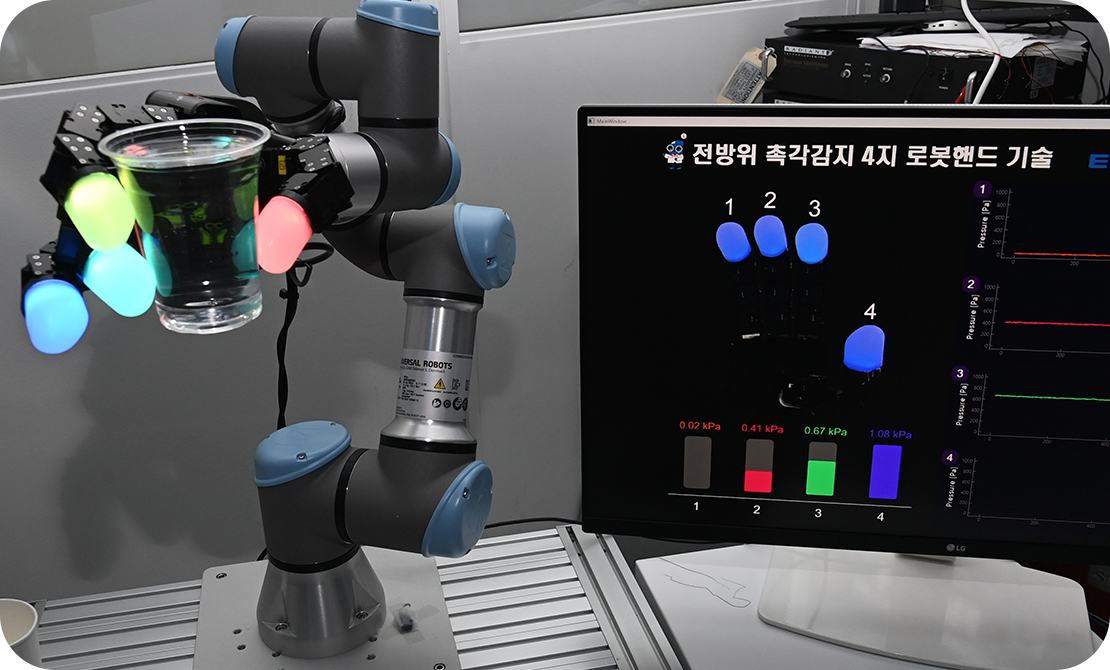
ETRI researchers have successfully developed a robotic finger capable of precisely detecting omnidirectional pressure. The development of intelligent robotic hand technology, which can adjust its grip strength according to the stiffness of objects, is expected to bring about innovation in ultra-precise object recognition.
Electronics and Telecommunications Research Institute (ETRI) announced the development of a new tactile sensor technology that can very precisely detect pressure regardless of the direction applied. The commercialization timeline is anticipated for the latter half of this year, following technology transfer.
ETRI has entered into a mutual cooperation agreement with Wonik Robotics and jointly exhibited related achievements at the 『Smart Factory & Automotive Industry Exhibition (SFAW 2024)』 held at COEX in Seoul for three days starting from the 27th of last month.
The tactile sensor technology introduced by ETRI features a robotic finger with stiffness (modulus) and shape similar to that of a human finger. It is capable of flexibly handling everything from hard objects to deformable soft objects.
The research team has explained that this technology overcomes the technical limitations of pressure sensors applied to existing 3D-shaped robotic fingers, which previously showed distorted signals depending on the direction in which the object was grasped. It is also highly rated for its performance and reliability, marking a new era in the intelligence of robotic hand technology.
The core of this technology lies in its ability to precisely detect pressure from various directions even in a three-dimensional finger form, while simultaneously providing the flexibility to handle objects as naturally as a human hand.
The research team explained that this robotic finger technology has been advanced by integrating omnidirectional pressure sensing with flexible air chamber tactile sensor technology, high-resolution signal processing circuit technology, and intelligent algorithm technology capable of real-time determination of an object’s stiffness.
Choi Jung Rak, Researcher
Intelligent Components and Sensors Research Section
(+82-42-860-3972 cjr1992@etri.re.kr)
News 2
ETRI Wins ‘iF Design Award’ for Mobile Collaborative Robot
- A remarkable achievement recognized by the design world in the UX category of one of the top three design awards globally.
- Developed MOBY Teach Pendant, making it easy for people to teach robots.
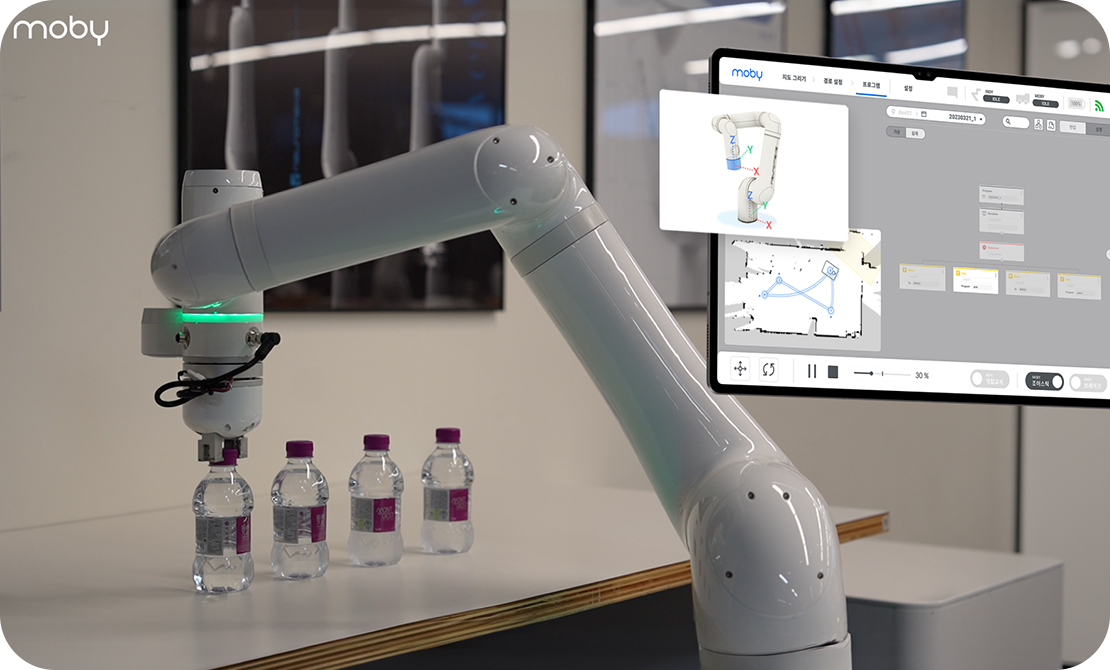
ETRI research team has won a main prize at the German International Design Competition, one of the top three design award competitions in the world. This signifies global recognition of our research team’s technology.
Electronics and Telecommunications Research Institute (ETRI) announced that its Teach Pendant software for the autonomous mobile collaborative robot (MOBY) won the main prize in the User Experience (UX) category at the ‘iF Design Award 2024’, an international design competition in Germany.
ETRI, in collaboration with Neuromeka and the research team of Professor Seung-Heon Yoo from the Department of Art and Design at Korea University, has been recognized for its proficiency in the UX category with the ‘MOBY SW’, a teach pendant for a manipulator based on mobile robots.
The award-winning work is the Teach Pendant application, a user interface software for autonomous mobile manipulators. This app has been highly praised for its user-friendly and intuitive design.
ETRI was responsible for the entire UX design and development of the Teach Pendant (MOBY app). Korea University took charge of the UX/UI design for the Teach Pendant app of the mobile manipulator, while Neuromeka developed the hardware and framework for the mobile manipulator.
A mobile manipulator refers to a combination of a wheeled mobile robot capable of moving around and a robotic arm designed for performing tasks. It describes a robot that is simultaneously controlled to carry out movement and manipulation operations.
The MOBY SW has significantly improved upon the inconvenience users faced with traditional teach pendant products, which required separate instructions for the mobile robot and the manipulator. It now allows for the movement and operation of both the mobile robot and the manipulator to be instructed simultaneously within a single software.
ETRI researchers have explained that with the developed teach pendant, it is now possible to simultaneously set destinations and paths for the autonomous navigation of mobile robots, as well as instruct manipulators for object manipulation tasks, significantly enhancing user convenience.
Jeyoun Dong, Senior Researcher
Robotics & Mobility Research Section
(+82-53-670-8048 jydong@etri.re.kr)
News 3
ETRI published Key International Standards for Wearable Healthcare
- Published two essential performance test standards for healthcare using wearable devices.
- Formed a new group for the standardization of next-generation wearable applications, including sleep measurement.
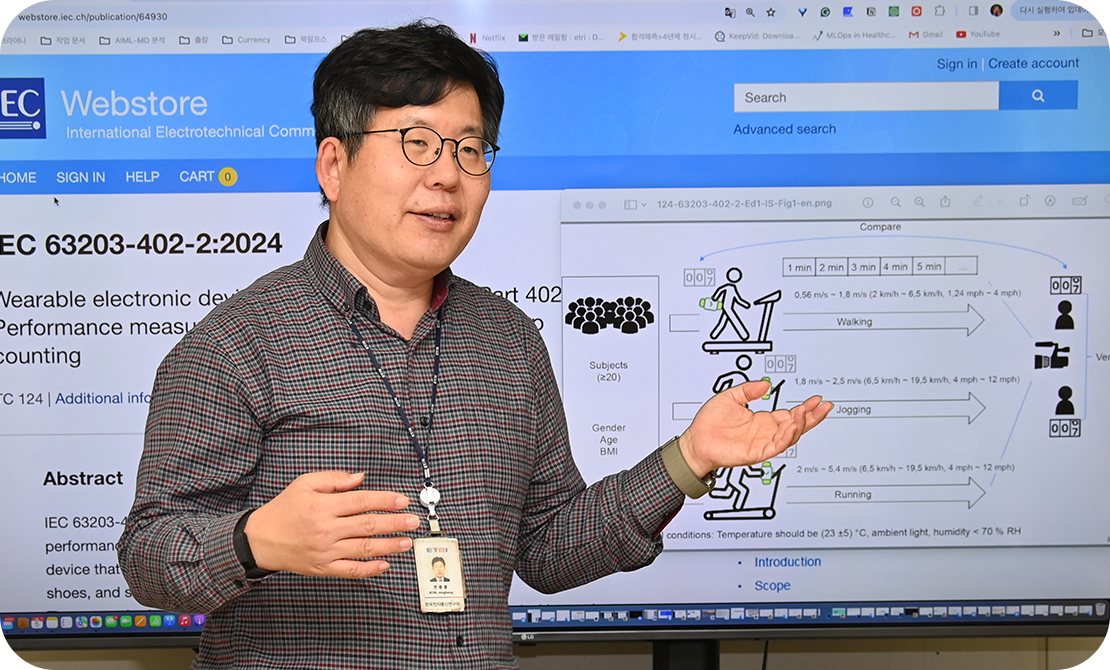
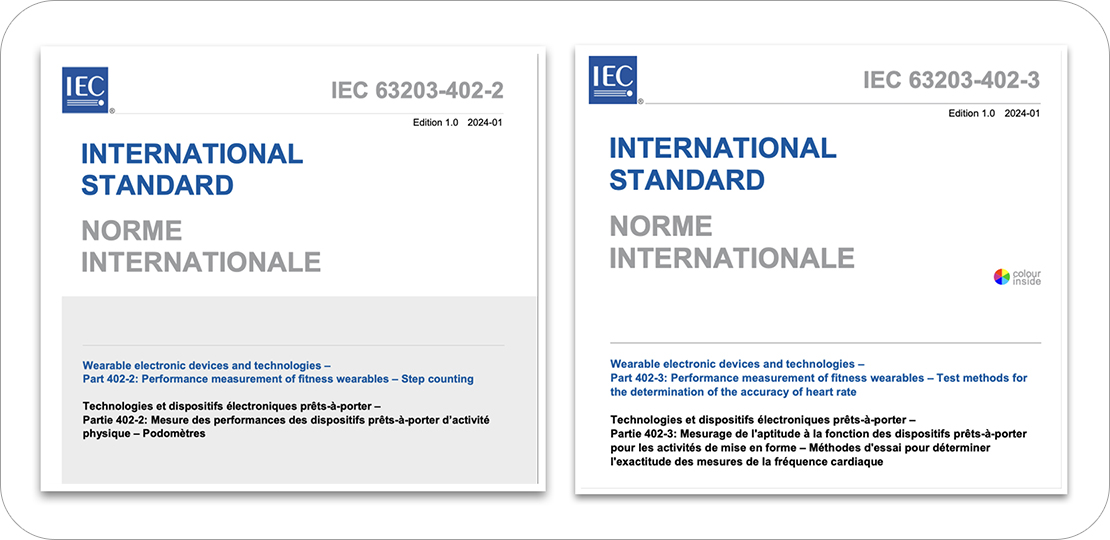
Two International Standards on 『Performance Testing of Wearable Devices for Health Management』
(Left) IEC 63203-402-2, (Right) IEC 63203-402-3
ETRI researchers have published key international standards for testing the accuracy of essential health management functions, such as step counting and heart rate monitoring, in wearable devices. This initiative has created a global common criterion for evaluating measurement accuracy in wearable devices.
Electronics and Telecommunications Research Institute (ETRI) announced that two international standards related to the 『Performance Testing of Wearable Devices for Healthcare and Wellness』 were officially published in January. The publication of these international standards is expected to set quality criteria and improve measurement accuracy, which will not only contribute to enhancing public health but also stimulate the related equipment and service industries.
The international standards that were published are the International Electrotechnical Commission (IEC)’s “Test Method for Step Counting” and “Test Method for Heart Rate Measurement” These standards contain the methods and procedures for testing the measurement accuracy of fitness wearable devices that offer step counting and heart rate monitoring functionalities.
The research team pointed out that although over 500 million wearable devices such as smart bands, watches, and rings are sold annually for health management, there have been no standardized test methods for the accuracy of basic physical activity measurements like step counting and heart rate monitoring. This lack made it impossible to objectively compare performance and accuracy, which was a key reason for the publication of these international standards.
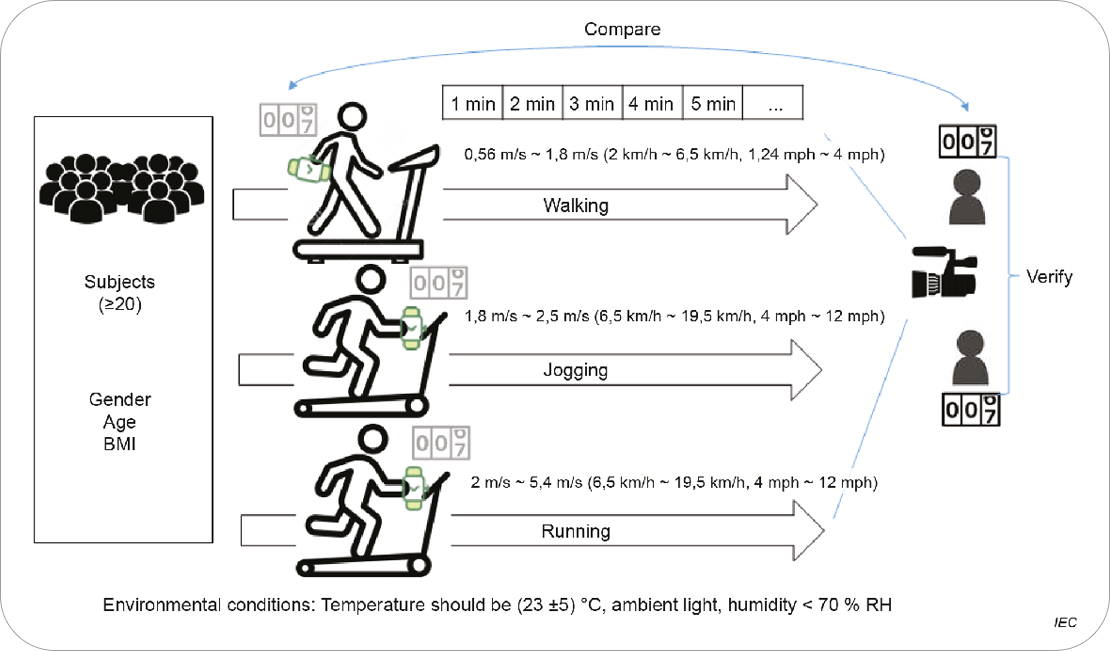
ETRI, in collaboration with major domestic companies, embarked on developing standards for testing the accuracy of step counting and heart rate monitoring. The research, which began in 2019, led to the proposal of international standards and culminated in their final publication six years later.
Jeon Jonghong, Principal Researcher
Intelligence & Information Standards Research Section
(+82-42-860-5333 hollobit@etri.re.kr)
 Previous
Previous